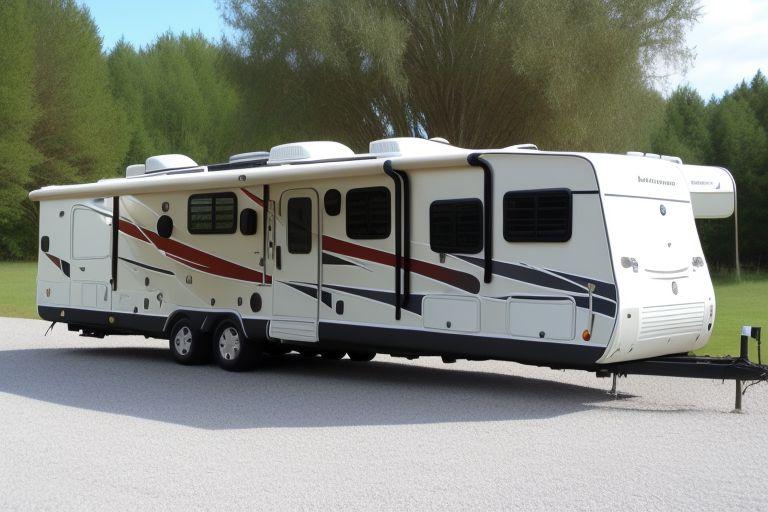
RV transport involves moving recreational vehicles from one location to another, whether it's across town or across the country. This process can be undertaken by RV owners themselves or by hiring a professional RV transport company. These companies specialize in ensuring that RVs are transported safely and efficiently, minimizing risks and challenges along the way.
Understanding what are the risks and challenges involved in RV transport is crucial for RV owners. Knowing the potential pitfalls helps in preparing adequately and choosing the right RV transport company. Whether it’s mechanical failures, adverse weather conditions, or navigating difficult roadways, being aware of these challenges allows owners to take preventive measures. Moreover, selecting a reliable and reputable RV transport company can significantly reduce the stress and complications associated with moving recreational vehicles. Proper preparation and the right choice of service provider are key to a smooth RV transport experience.

Key Risks and Challenges in RV Transport
RV transport involves moving recreational vehicles from one location to another, which can present several risks and challenges. Understanding these can help RV owners better prepare for the process. When considering what are the risks and challenges involved in RV transport, several key factors come to light:
- Mechanical failures: RVs, with their complex systems, are prone to mechanical issues during transport.
- Weather conditions: Adverse weather can pose significant risks, potentially damaging the vehicle.
- Road hazards: Navigating difficult road conditions increases the likelihood of accidents, further complicating the transport process.
Beyond the risks, there are numerous challenges associated with RV transport. Compliance with regulatory requirements, managing costs, and ensuring adequate insurance coverage are significant hurdles. Choosing the right RV transport company is crucial to mitigate these challenges. Professional RV transport companies offer expertise and reliability, but RV owners must evaluate services carefully. Security concerns, such as theft and vandalism, also require attention, making it essential to select reputable RV transport companies that prioritize safety.
Weather-Related Challenges
Weather conditions play a critical role in RV transport. Adverse weather can significantly affect the safety and timing of transporting recreational vehicles.
Weather-related challenges include heavy rain, snow, ice, and strong winds. These conditions can make roads slippery and visibility poor, increasing the risk of accidents. Extreme temperatures can also impact the mechanical components of an RV, potentially leading to breakdowns. Moreover, severe weather can cause delays, disrupting schedules and plans.
To address these challenges, RV owners and transport companies should monitor weather forecasts closely and plan routes accordingly. Avoiding transport during extreme weather conditions is advisable. When transport is necessary, ensuring the RV is well-prepared for the conditions is crucial. This includes checking the vehicle's heating and cooling systems, ensuring all weather seals are intact, and using appropriate tires for the expected conditions. Reputable RV transport companies often have contingency plans for weather-related disruptions, providing alternative solutions to ensure the safe and timely delivery of the RV.
Road Conditions and Accidents
Navigating Difficult Road Conditions
Road conditions can pose significant challenges during the RV transport journey. Transporting RVs requires careful planning and execution, especially when navigating through varied and often unpredictable terrains.
Challenges with Different Types of Roads
- Urban Roads: Heavy traffic and narrow streets can make it difficult to maneuver large recreational vehicles safely.
- Rural Roads: These roads often have uneven surfaces, sharp turns, and limited visibility, increasing the risk of accidents.
- Highways: While generally more manageable, highways still present challenges such as construction zones and heavy traffic.
- Accident Risks and Prevention: To ensure the RV transport journey is safe, it’s crucial to prepare adequately:
- Tire Pressure: Regularly check tire pressure to avoid blowouts and maintain control.
- Specialized Equipment: Using the right tools and equipment ensures the RV is securely attached and stable during transport.
- Professional RV Transport Companies: Hiring experienced professionals who are familiar with navigating various road conditions can significantly reduce the risk of accidents. These companies have the expertise to handle unexpected challenges and ensure the RV arrives safely at its destination.

Regulatory and Legal Challenges
Transporting RVs across state lines or even within the same state involves complying with a range of regulatory and legal requirements. The transportation industry is heavily regulated to ensure safety and standardization.
- Permits and Documentation: Different states have varying requirements for permits and documentation needed for RV transport. Ensuring all paperwork is in order is essential to avoid legal issues.
- Weight and Size Limits: Recreational vehicles often have specific weight and size restrictions that must be adhered to during transport. Non-compliance can result in fines and delays.
- Safety Standards: RV transport companies must comply with federal safety standards to ensure the vehicle is transported safely.
- Permits and Documentation Needed
- Transport Permits: Required for moving oversized or overweight RVs.
- Insurance Coverage: Adequate insurance is necessary to protect against potential damages during transport.
- Compliance with Regulations: Ensuring compliance with all state and federal regulations can be complex. Professional RV transport companies can assist with navigating these legalities, ensuring a smooth and lawful transport process.
Security and Theft Risks
Security is a major concern for RV owners during the transport process. Recreational vehicles are valuable assets, and their transport can attract unwanted attention.
Common Security Risks are below
- Theft: RVs can be targeted by thieves during transport, especially when left unattended.
- Vandalism: Acts of vandalism can cause significant damage to the RV, leading to costly repairs.
- Tips for Securing an RV During Transport
- Secure Locking Mechanisms: Ensure all doors and windows have secure locks to prevent unauthorized access.
- GPS Tracking: Installing a GPS tracking system allows RV owners to monitor the location of their vehicle in real-time.
- Professional RV Transport Service: Choosing reputable and experienced RV transport companies that prioritize security can greatly reduce the risks. These companies use specialized equipment and protocols to ensure the RV is transported safely and securely.
Selecting a reliable RV transport service that understands the importance of security can provide peace of mind to RV owners, ensuring their vehicle is well-protected throughout the transport journey.
Cost-Related Challenges
Transporting RVs involves more than just moving a vehicle; it comes with various financial risks and potential unexpected costs. Understanding these can help RV owners plan better and avoid surprises.
Breakdown of Transport Costs
- Transport Company Fees: The primary cost includes the fees charged by the RV movers. These fees can vary widely depending on the distance, size of the RV, and specific requirements.
- Fuel Surcharges: Rising fuel prices can significantly increase the cost of transport.
- Special Equipment: If your RV has special requirements, such as needing to transport propane tanks or other hazardous materials, additional fees may apply.
Hidden Fees and How to Avoid Them
- Insurance Costs: Ensure you understand what insurance coverage is provided by the transport company and whether additional coverage is needed. This can prevent unexpected expenses in case of RV accidents.
- Permits and Tolls: Some routes may require special permits or have tolls, adding to the overall cost. Confirm these details with your transport company.
- Storage Fees: If there are delays in the transport process, you may incur storage fees. Clarify these potential costs upfront.
By being aware of these costs and working with a transparent and reputable transport company, RV owners can ensure a smoother and more predictable financial experience.

Insurance and Liability Issues
Insurance is a critical component of the RV transport process. It provides peace of mind and protects RV owners from financial losses in case of damage or accidents.
Types of Insurance Required for RV Transport
- Comprehensive Insurance: Covers a wide range of potential damages, including those from accidents, weather, and vandalism.
- Liability Insurance: Protects against claims in case the transport company is found liable for any damages during transport.
- Specialized Coverage: For RVs with specific features, such as propane tanks or travel trailers, additional coverage may be necessary to ensure all aspects are protected.
Dealing with Liability in Case of Damage
- Transport Company’s Liability: Ensure that the transport company’s insurance adequately covers any potential damages. Ask for proof of insurance and read the fine print to understand the extent of coverage.
- Owner’s Responsibility: While the transport company should have insurance, RV owners should also check their own policies to see if additional coverage is needed.
- Claims Process: Understand the process for filing a claim in case of damage. This includes knowing the documentation required and the timeline for reporting issues.
By securing proper insurance and understanding liability issues, RV owners can ensure a smooth and safe journey for their vehicles.
Choosing the Right Transport Service
Choosing the right RV transport company is crucial to ensure a smooth and safe journey for your recreational vehicle. Here’s how to select the best service for your needs.
- Reputation and Experience: Look for RV movers with a strong reputation and extensive experience in the transportation industry. Customer reviews and testimonials can provide insights into their reliability.
- Specialized Equipment: Ensure the company has the necessary equipment to handle your specific type of RV, whether it's travel trailers, camper vans, or other types of recreational vehicles.
- Insurance and Licensing: Verify that the company is fully insured and licensed to transport RVs. This provides peace of mind that your RV is protected during the transport process.

Conclusion
Understanding what are the risks and challenges involved in RV transport allows RV owners to prepare effectively and make informed decisions. By taking preventive measures, ensuring proper maintenance, and working with professional RV transport companies, RV owners can minimize risks and ensure a smooth and safe journey for their recreational vehicles. Adequate insurance coverage and compliance with legal requirements provide additional peace of mind. Ultimately, selecting the right RV transport company is crucial for a successful and hassle-free transport experience.
Ready to transport your RV safely and efficiently? Choose A1 Auto Transport for a smooth and worry-free experience. Our professional RV transport services ensure your recreational vehicle reaches its destination securely. Contact us today to get started and enjoy peace of mind with our reliable and experienced team!






 Share on Facebook
Share on Facebook Share on LinkedIn
Share on LinkedIn Share on Twitter
Share on Twitter




 Google
Google  Instagram
Instagram  Trustpilot
Trustpilot 



